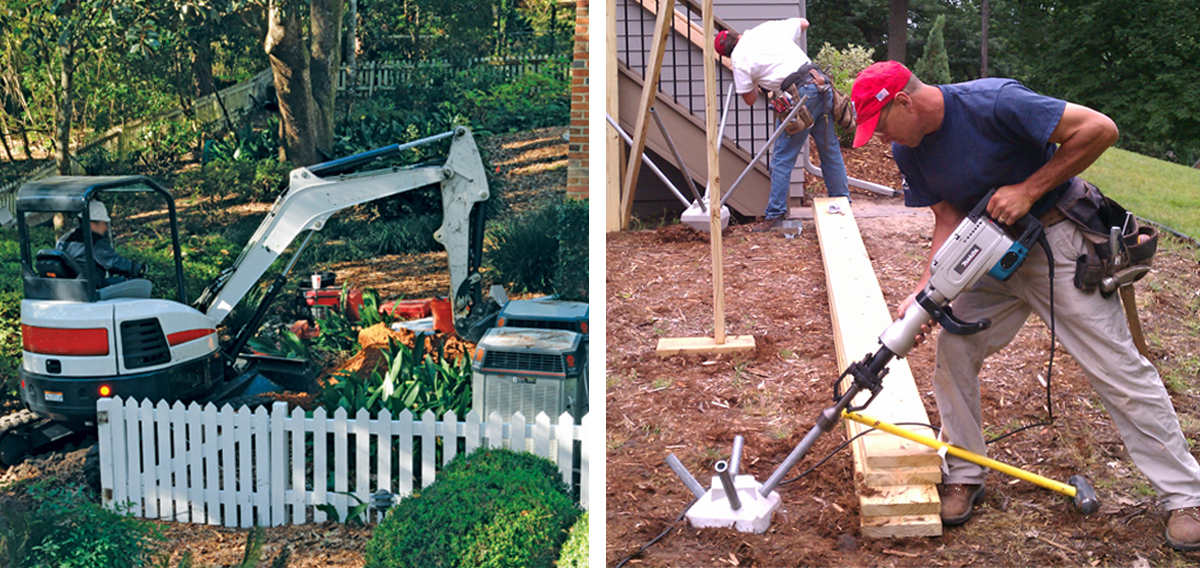Choosing the Right Residential Deck Footing
How the Top Alternative Solutions Compare
When constructing a residential deck, the foundation serves as the vital support for the entire structure. A strong and stable foundation not only ensures the safety of your deck but also contributes to its longevity and performance. Among the various options available, helical piles and Diamond Pier Foundations have gained popularity as innovative solutions for residential deck footings.
Diamond Pier Footings
Diamond Pier Foundations present an innovative alternative to traditional concrete footings. The system consists of an engineered precast concrete head and four galvanized steel pins locking the head into the ground. One notable advantage is the rapid installation process with increased project turns. This results in easier project scheduling, and reduced labor cost than other methods, thereby expediting the overall deck construction timeline.
Diamond Pier is specifically engineered for deck and other residential projects, providing documented structural values for bearing, uplift and lateral loads. With higher project turnover rates, contractors can capitalize on seasonal demands and fluctuations in the market, further optimizing their profitability and long-term growth prospects.
Diamond Piers are code-compliant and do not require an inspection prior to installation. Staying up to date with the latest ICC (International Code Council) codes facilitates smooth approval processes from building inspectors, streamlines the construction timeline and contributes to the project's efficiency. Additionally, Diamond Pier foundations entail minimal disturbance to the soil, making them ideal for preserving the landscape. Their versatility shows through in their adaptability to various soil types and terrains, catering to both level and sloped properties.
Helical Footings
Helical footings, also known as screw piles or helical piles, have been utilized in commercial and industrial projects for decades. These footings are essentially large screws that are driven into the ground using large hydraulic machinery. Helical footings offer a range of benefits for construction projects, as they are much quicker to install than a traditional poured concrete footing, and they offer a heavy-duty solution for most problem sites.
Helicals are best used in problem soils and provide stability in areas susceptible to boggy soils. Moreover, these footings boast a sturdy load-bearing ability, making them particularly excellent for supporting heavy loads in problem soils.
Are Diamond Piers or Helical Piles Right for your Project?
Selecting between Helical Piers vs Diamond Piers depends primarily on soil conditions and load-bearing requirements. Consider these points before making your decision:
Value
Residential Diamond Pier models DP50 & DP75 are designed and engineered specifically as a deck footing providing a better value due to a highly efficient installation. This targets the application directly and provides the best value for the intended use. They also require less labor and equipment. Additionally, Diamond Piers involve minimal disturbance to the surrounding soil, potentially reducing landscaping repair costs and dirt removal.
Helical piles may initially incur higher expenses due to their heavy-duty application which often involves large, specialized machinery and skilled labor. When choosing, consider which is the most applicable product for the project design. For example, if the application requires the deck to support 60 PSF, there is no need to design the beams and joist to support 100 PSF, if there is no intention to support a greater load.
Soil
Diamond Piers offer an equivalent structural support when compared to a poured concrete footing, with the added benefits of rapid installation and minimal soil disruption. Diamond Pier has the ability to support an equivalence of a 24”x60” concrete footing (Check the Diamond Pier Residential Load Chart for equivalency) However, it is essential to note that Diamond Piers may not be suitable for projects facing problem soils that would impede the use of this size concrete footing, such as swampy areas with weak soil below 1500 PFS compaction. Residential Diamond Piers are ideal for deck and porch projects with typical, normal soil conditions, as they are engineered for this specific use.
In cases where soil conditions pose a severe challenge of weak boggy soils, opting for helical piles might be the more appropriate choice. Helical piles provide an excellent solution, capable of addressing problem soil conditions making them particularly advantageous for projects encountering problem soils that would hinder the installation of other traditional foundation types.
Scheduling
Utilizing Diamond Piers presents a notable advantage in expediting project completion, as it eliminates the need for scheduling a subcontractor for foundation installation. Builders can seamlessly integrate Diamond Piers into their construction timeline without relying on external scheduling constraints, resulting in faster project turnaround times.
Opting for helical piles may necessitate coordinating with a subcontractor specialized in their installation, potentially leading to scheduling delays, plus added logistical complexities. The more efficient process of incorporating Diamond Piers directly into the construction workflow allows builders to maintain greater control over project timelines and efficiently manage resources, ultimately contributing to smoother project execution and timely delivery.
The Best Choice
For any professional builder, having options like Diamond Pier and helical footings for deck foundations is invaluable. These alternatives offer versatility and adaptability to different soil conditions and project requirements. The choice between the two, largely depends on your specific project requirements and soil conditions. Diamond Piers provide a robust and efficient solution, with quick installation and minimal site disturbance. Helical footings excel best in challenging soil conditions, offering stability and support where traditional concrete footings may fail. Whichever option you choose, investing in a solid foundation ensures the durability of your deck and peace of mind for years to come.
Related: How Diamond Pier Works


